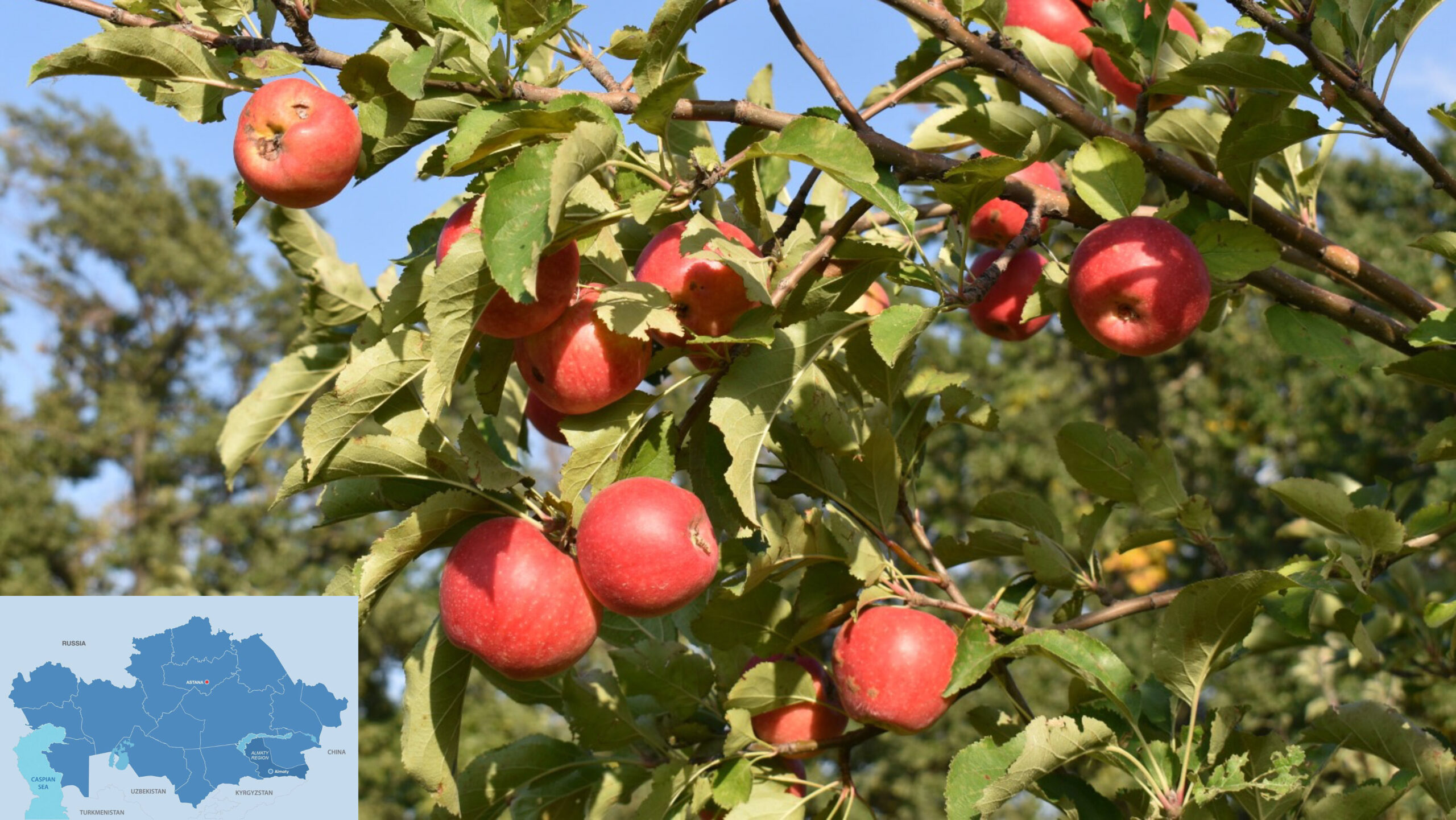ASTANA – Private gardeners and associations are making efforts to revive the aport apple—a national treasure with its rich red color and vibrant flavor—bringing it to tables across Kazakhstan and beyond.

Aport apple. Photo credit: primeminister.kz. Click to see the map in full size. The map is designed by The Astana Times.
These legendary apples once blanketed the mountainous regions near Almaty, but with urbanization, only a few orchards remain, putting the once-abundant fruit at risk.
Saule Kazybayeva, deputy chair of the Kazakh Scientific Research Institute of Fruit Growing and Viticulture, told Kazinform news agency in an interview that traders once transported these unique apples to Siberia and the South via railroad stations.
The aport variety spread rapidly across southeastern Kazakhstan, particularly in the mountainous regions of the Zailiyskiy Alatau. Thanks to the efforts of the Vernyi Horticultural School and gardener Moiseyev’s large private orchard, which supplied over 100,000 seedlings annually, the variety spread rapidly.
Large-scale construction and commercial interest have destroyed once flourishing aport gardens.
“In Almaty, as in other major cities, urbanization transformed the landscape, particularly in areas that were once home to orchards. New residential, commercial, and infrastructure developments replaced the fruit trees. As a result, many of the old apple farms that once produced aport apples have vanished,” said Kazybayeva.
“With the development of agriculture and agricultural techniques, more productive and resistant varieties of apple trees became prevalent. Varieties such as Golden Delicious or Red Delicious were chosen for mass production. They are easier to transport and have a longer shelf life. In contrast, aport apples require special care and cannot be stored for a long time, which makes their commercial cultivation less profitable,” she added.
Challenges of growing aport
Today, aport apples are grown and tended back into existence by local gardeners and associations.
Roman Safarov, president of the Almaty Aport Producers Association, highlights the aport apple’s remarkable size. On average, the apples weigh between 250 and 400 grams, with some reaching an impressive 900 grams.
“One of the main features of Almaty aport is its pleasant aroma, which is not found in any other variety of apples. Another unique feature is that it makes a characteristic crunchy sound when you bite into it,” said Safarov to Kazainform.
Growing an aport tree takes decades and requires considerable effort, but their efforts are starting to see results.
“It’s a rather delicate and demanding tree, requiring special knowledge and skills for planting and care. However, if provided with the right conditions, it can yield large, juicy, and beautiful apples. Besides, the tree only starts bearing fruit in its eighth or ninth year, which makes this variety less appealing to most gardeners. The association, however, brings together enthusiasts who are genuinely passionate about this apple,” said Safarov.
Experts point out that high-quality aport apples can only be grown in orchards at altitudes of 850 to 1,250 meters above sea level. However, such suitable areas are limited to the foothills of Almaty and the Almaty Region.
The Almaty Region’s Department of Agriculture shared with Kazinform a yearly decline in apple quality, with aport orchard areas shrinking from 1,071 to 446 hectares due to their vulnerability to various diseases.
According to Safarov, aport producers do not receive specific state support, though the issue is being addressed at the government level.
“There are no dedicated subsidies for aport apples yet. Subsidies have only been extended to intensive horticulture. The Ministry of Agriculture has been tasked with exploring amendments to the subsidy rules to include aport cultivation. At the same time, we believe it would be more effective to focus on lending solutions—providing long-term loans at minimal interest rates—along with considering insurance options, as this is crucial for us,” Safarov said.
Government’s initiative on aport revival
The Kazakh Ministry of Agriculture and the National Agrarian Scientific and Educational Center have developed a program to revive the aport apple variety from 2024 to 2028. The initiative involves private investors and specialized nursery farms and aims to green 110 hectares of land.
According to the ministry data, today, the total area of aport trees in the Almaty and Zhetisu regions is 2,500 hectares and counts for around 416,000 trees. The Almaty Department of Entrepreneurship and Investments reported that aport apple trees grow on around 230 hectares of land in the city.
“In the first phase of the project in 2024, seeds from Sivers apple trees were collected. In 2025, seedling planting will begin at the Talgar Kazakh Research Institute of Fruit and Vegetable Growing on a 10-hectare plot, which will serve as a mother and cuttings orchard for nursery farms. This initiative will pave the way for expanding aport apple cultivation among private gardeners,” the ministry shared with Kazinform.
A 17-hectare plot located just five kilometers from Almaty’s Al-Farabi Avenue has been designated for this purpose.
